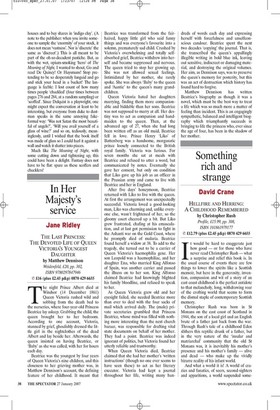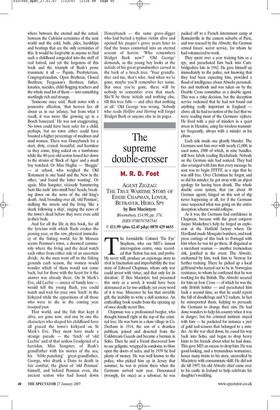Something rich and strange
David Crane HELLFIRE AND HERRING: A CHILDHOOD REMEMBERED by Christopher Rush Profile, £15.99, pp. 308, ISBN 101861979177 £12.79 (plus £2.45 p&p) 0870 429 6655 1 t would be hard to exaggerate just how good — or for those who have never read Christopher Rush — what a surprise and relief this book is. In the usual course of events there are few things to lower the spirits like a Scottish memoir, but here in the generosity, invention, compassion and wit of a story of an east coast childhood is the perfect antidote to that melancholy, long, withdrawing roar of the crofting world that seems to form the dismal staple of contemporary Scottish memory.
Christopher Rush was born in St Monans on the east coast of Scotland in 1944, the son of a local girl and an English brute of a father just back from the war. Through Rush's tale of a childhood Eden slithers this reptilic drunk of a father, but in the very nature of the 'insular and matriarchal' community that the old St Monans was, it is inevitably his mother's presence and his mother's family — alive and dead — who make up the vividly bizarre reality of his infant world.
And what a world it is! A world of crazies and fanatics, of seers, second-sighters and apparitions, a world suspended somewhere between the eternal and the actual, between the Calvinist certainties of the next world and the cold, boils, piles, hardships and beatings that are the only certainties of this. It would be forgivable in anyone to find such a childhood congealed into the stuff of real hatred, and yet the largeness of this book and the triumph of Rush's prose transmute it all — Papists, Presbyterians, Congregationalists, Open Brethren, Closed Brethren, Fergusson's Brethren, father, lunatics, suicides, child-flogging teachers and the whole mad lot of them — into something startlingly rich and strange.
'Someone once said,' Rush notes with a possessive affection, `that heaven lies all about us in our infancy, but from what I recall, it was more like growing up in a Bosch boneyard.' He was not exaggerating. No town could have been safer for a child, perhaps, but no town either could have boasted a higher percentage of madmen and mad women. There was Honeybunch for a start, dirty, crazed, beautiful, and harmless as they come, lying naked on a tombstone while the 80-year-old sexton hosed her down to the strains of 'Rock of Ages' and a small boy watched. Or Miss Hughie — `Shuggie' — at school, who weighed the Old Testament in one hand and the New in the other, 'and found the latter wanting'. Or again, Miss Sangster, viciously 'hammering facts like nails' into small boys' heads, breaking down on the news of the old king's death. And, brooding over all, 'old Penman', stalking the streets and the living 'like a shark following a ship', ringing the news of the town's dead before they were even cold in their beds.
And for all the life in this book, for all the lyricism with which Rush evokes the passing year, or the raw, physical immediacy of the fishing world, his St Monans seems Penman's town, a doomed community where the living and the dead watch each other from either side of an uncertain divide. As the men went off to the fishing grounds each season, the women would wonder which of them would not come back, but for those with the heart for it the answer was already there. On St Mark's Eve, old Leebie — source of family lore — would tell the young Rush, you could watch and wait for your own 'fetch' in the kirkyard while the apparitions of all those who were to die in the coming year trooped past.
That world, and the fish that kept it alive, are gone now, and one by one the characters who shaped his childhood have all graced the town's kirkyard on St Mark's Eve. They must have made a strange parade — the 'fetch' of 'old Leebie' and of that sexless Gradgrind of a harridan, Miss Sangster; of Rush's grandfather with his stories of the sea, his 'bible-punching' great-grandfather, George, who drank a Dane to death in fair combat; the ghost of 'old Penman' himself, and behind Penman even, the ancient sexton who had hosed down Honeybunch — the same grave-digger who had buried a typhus victim alive and opened his pauper's grave years later to find the bones contorted into an eternal scream of horror. 'Who remembers Bridget Burk now?" Old George' demands, as the young boy looks at the initials of his great-grandmother carved in the bark of a beech tree. 'Your grandfather and me, that's who. And when we're gone, maybe you'll remember her name. But once you're gone, there will be nobody to remember even that much. She'll be these initials and nothing else, till this tree falls — and after that nothing at all.' Old George was wrong. Nobody who reads Hellfire and Herring will forget Bridget Burk or anyone else in its pages.















































 Previous page
Previous page